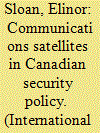| Srl | Item |
| 1 |
ID:
171573


|
|
|
| 2 |
ID:
184509


|
|
|
|
|
| Summary/Abstract |
We have entered a new space era, projecting all the Earth’s great power pathologies—ambition, fear, and greed—into the heavens.
|
|
|
|
|
|
|
|
|
|
|
|
|
|
|
|
| 3 |
ID:
179854


|
|
|
|
|
| Summary/Abstract |
This article traces Canada’s early interest in space, before turning to its late 1960s decision to focus on a domestic, commercial/civilian communications satellite system in geostationary orbit and the subsequent decline in Canada’s military space efforts. It then highlights the wake-up call of the 1991 Gulf War, which demonstrated the critical importance of military communications satellites to future operations, and the steps Canada has taken to gain assured access to such satellites in the decades since. The final section outlines recent advances in low Earth orbit satellite communications (LEO satcom) and the ways in which these systems can address shortfalls in their geostationary cousins. Drawing reference to a new international security environment, it concludes that Canada should move expeditiously to incorporate LEO satcom into efforts to address the growing imperative of military satellite communications in the Canadian Arctic.
|
|
|
|
|
|
|
|
|
|
|
|
|
|
|
|
| 4 |
ID:
127552


|
|
|
|
|
| Publication |
2013.
|
| Summary/Abstract |
On May 24, 2012 SpaceX's Dragon capsule was launched and in doing so became the first commercially built vehicle to berth with and carry cargo to the International Space Station (ISS). It successfully completed its mission and returned to the Pacific Ocean on May 31, 2012.1 The docking of Dragon represented a historic moment where a commercial enterprise managed to achieve that which had previously only been accomplished by governments. "In the history of spaceflight - only four entities have launched a space capsule into orbit and successfully brought it back to Earth: the United States, Russia, China, and SpaceX".2 While this is a monumental accomplishment for private industry, we cannot ignore the value of public-private partnerships and the role that government played in enabling this incredible achievement.
In this paper I will examine how public-private partnerships are enabling the development of the commercial space industry, viewed through the lens of the Rethinking Business Institutional Hybrid Framework put forward by University of Oxford professors Marc Ventresca and Alex Nichols in their Rethinking Business MBA course. I intend to demonstrate that the NASA versus Commercial Space argument is a false dichotomy and that only by working together can both sectors continue to push the boundaries of space travel and exploration. I plan to do this by first discussing how the NASA-SpaceX partnership came about and the reasoning behind it. I will then explore what a public-private partnership (PPP) is, as compared to other government privatization schemes, and explain why Space Act Agreements are significantly different from anything done previously. I will then analyze the impact of these agreements and outline their benefits in order to demonstrate the value they create, especially in areas of mutual value creation and economic development.
|
|
|
|
|
|
|
|
|
|
|
|
|
|
|
|